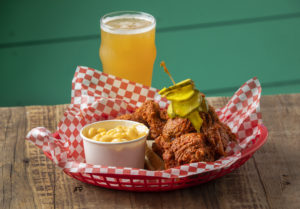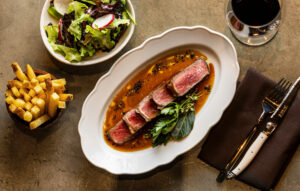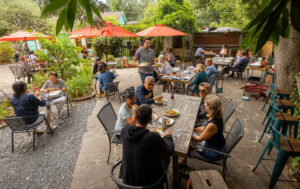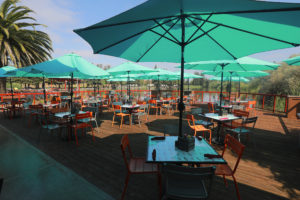 Keenly competitive, dozens of gastro-minded teens have prepped for weeks – even months for Thursday’s Wine Country Chefs of Tomorrow competition – and county’s top showcase of young culinary talent. Dressed in crisp chef’s whites and serving up locally-sourced dishes of the restaurant-caliber quality, high schoolers from seven local schools will participate in the showdown. And make no mistake, they take winning very seriously.
Keenly competitive, dozens of gastro-minded teens have prepped for weeks – even months for Thursday’s Wine Country Chefs of Tomorrow competition – and county’s top showcase of young culinary talent. Dressed in crisp chef’s whites and serving up locally-sourced dishes of the restaurant-caliber quality, high schoolers from seven local schools will participate in the showdown. And make no mistake, they take winning very seriously.
This is no glorified home-ec demonstration, but a competition for aspiring cooks. Paired with executive chefs from throughout the county the students hone prize-winning appetizers for a hungry crowd of nearly 300 at the Vintners Inn, hoping to win either the People’s Choice Award or nods from several “celebrity” judges who rank their dishes.
Though bragging rights are a perk, schools divide funds raised by the event equally. Last year, each of the participating schools received about $1,500 for their culinary programs from the Sonoma Lodging Association, which hosts the event.
This year’s theme challenges students to explore dishes from the heritage and backgrounds of the participating executive chefs – meaning everything from Midwestern home cooking to German and Asian influences.
Chef Richard Whipple of Hyatt Vineyard Creek/Brasserie, who is paired with culinary students from Windsor High School, looked to his grandmother’s chicken and dumplings for inspiration. “They were inspired by me learning to cook with her,” he said. Other dishes the students from Windsor will be serving are equally comforting: Asparagus with cheese and butterscotch pudding.
At Maria Carrillo, culinary teacher Mary Schiller is keeping things under wraps. Working with Chef Rene Jakushak of Santa Rosa’s Hilton/Nectar Restaurant, they were inspired by Jakushak’s German heritage. “My kids are very competitive,” she said. Maria Carillo has won the People’s Choice Award five times.
Also competing this year are: Casa Grande High School with Sheraton/Tolay Restaurant Chef Danny Mai; El Molino High School with Bodega Bay Lodge/Duck Club Chef Jeff Reilly; Healdsburg High School with Hotel Healdsburg/Dry Creek Kitchen Chef Dustin Valette; Piner High School with Applewood Inn and Restaurant Chef Bruce Frieseke; and Sonoma Valley High School with Fairmont Sonoma Mission Inn/Sante Chef Robert Champagne.
Since 1996, Sonoma County has offered career-focused culinary training at high schools, reflecting the area’s focus on hospitality and high end dining. An evolution of outmoded home economics classes that focused more on home cooking, the new breed of culinary programs are training students everything from kitchen chemistry to sanitation, food safety, knife skills and even real-life catering gigs as a technical career pathway to students seeking future employment in restaurants or hospitality.
The goal: A ServSafe certificate (certifying them a food handlers able to begin work at restaurants) or continued secondary training at advanced culinary programs like Santa Rosa Junior College’s Culinary program, the Culinary Institute of America or even the prestigious Johnson and Wales. Students also matriculate to hospitality and management programs, though not all students in the classes go on to culinary careers.
Despite difficult economic time for the restaurant industry recently, over the last decade, interest in classes has continued to increase exponentially, according to Stephen Jackson, Director of Career Development and Workforce Preparation Services at the Sonoma County Office of Education. About $500,000 of the office’s $3.8 million career technical education fund goes to culinary programs each year. Other programs include career training in automotive, construction, biotech, healthcare, energy or other technical trades.
“For our county and the student body here, I think it culinary programs highlight and celebrates one of the biggest industries in our county,” said Jackson. “And I think kids just like to cook. It’s a super hands on experience for young people to see results right away.”
Maria Carrillo High School offers one of the most rigorous culinary programs, including it’s own catering business that in 2010 served 6,000 meals doing crab feeds, retirements, weddings and non-profit events. Culinary teacher and catering director Mary Schiller said it’s a great opportunity for the students to learn how to cook and serve in a real world environment on evenings and weekends. She asks for a minimum $300 donation plus the cost of the food, booking one to two events each week. Though she doesn’t ask for it, the students often receive tips in addition to the work experience, netting the program about $7,000 each year.
“Our teachers in all the programs spend a lot of time with the students and serve as great mentors and someone the kids can talk to. Being in culinary programs in high school is both fun and pretty intense because you are putting out food for the public to consume,” said Nancy Miller, Director of Career Pathways and Community Outreach, which funds the Santa Rosa City Schools culinary programs. “These classes are so valuable for the next generation of kids going into our county’s workforce.”









